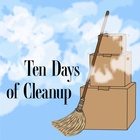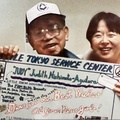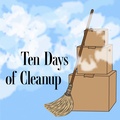I found the e-mail for my client, Ryan Stone, and began typing him a message.
Dear Mr. Stone:
I know that I’m two days away from my deadline to clear out your storage unit. I’m close to finishing but I regret that I’ll have to drop the project.
You can imagine that attempting a project of this size during a pandemic is quite a challenge. I’m discovering that it has been a strain on me and my daughter.
I know under the provisions of our agreement, if I break the contract, I will owe you $5,000. Since I’ve done almost all the work, I beg you to reconsider that clause.
I will prorate some of my fee to cover the few items that are remaining.
Sincerely,
Hiroko Houki, owner of Souji RS
I pressed the paper airplane icon and heard my message whoosh into the web.
I heard my phone ding with a quick e-mail response.
Dear Ms. Houki:
I’m sorry to hear that your daughter has been distressed by my project.
Of course, I will PayPal you full payment immediately.
My phone dinged again. Full payment sent to my PayPal account.
I was amazed that Mr. Stone complied to my request so easily. No pushback or complaints. Why had he seemed like such a monster client in the past?
Our waffle iron began to beep and I quickly speared a golden brown waffle onto a plate. I broke up the four squares and transferred two of them on a separate plate.
“So what are we doing today?” My daughter, Sycamore, emerged from the bedroom in a pair of fuzzy pink slippers and Pokemon pajamas.
“What do you mean?” I put one plate of waffles and the bottle of maple syrup in front of her.
“Aren’t we going to the unit to clean out the last items?” Sycamore poured the syrup on her waffle squares.
“Oh, Sycamore. We don’t have to. I already got paid.”
Sycamore continued to munch on her waffles. She remained quiet and thoughtful. It was time for me to step up and be a mom.
I blotted out a spilled drop of syrup from the table. “That message on that fortune. ‘You will never be alone.’”
“Yeah?” she asked.
“Why did that upset you so much?”
“I’m not sure.”
Finished with her breakfast, Sycamore got on my lap as if she had reverted to being five years old. She was so skinny and barely weighed anything. It was good to feel her so close to me.
“Just seeing all the news about the people getting sick and dying,” she said. “It makes me scared. That you’ll be gone and I’ll be alone.”
“But you’ll never be alone. There’s also Daddy and your brother. Besides, nothing will happen to me.” I knew that wasn’t a promise that I could really make. But I made it anyway.
“You’ve told me that I always need to finish something that I’ve started.”
“Yes. But not when it’s harmful. You can stop then.”
“I’m okay. I really am. I want to clean out the container.”
I took a deep breath. It didn’t make sense to do it. I had already gotten paid. But obviously these past eight days which we spent together cleaning out the storage unit had been meaningful to Sycamore.
We climbed into my truck and drove to EZ Storage. There were now only two piles of bags in the unit. On the right were burlap bags. They looked dusty and old so we put on our masks and latex gloves as we approached. I felt as if I was one of those forensic investigators in a crime TV show.
I gingerly loosened the twine holding one of the bags closed. Inside were small faded brown envelopes—Japanese writing on the outside.
Before I could stop Sycamore, she opened the top flap of an envelope. She wrinkled her nose. “Looks like seeds. Really old ones.”
On the outside of each envelope was the Japanese kanji for camellia, tsubaki, and then certain varietals that I had never heard of.
“What’s this say, Mom?” In Sycamore’s hands was a brittle and yellow document.
“It looks like some kind of custom form.” There was a name at the bottom. “This is a name. I think it’s read Uyematsu Miyosaku. Or Miyosaku Uyematsu, the American way.” There was an address in Montebello.
“Maybe he still lives there?”
“I don’t think so. These seed packets look like they are before World War II. The form is dated back in the 1930s.”
“How can we find his relatives?”
We exchanged glances. We knew exactly what we needed to do. The bags in the back of the truck, Sycamore searched the Internet on her iPad in the passenger’s seat.
“He has at least a couple of granddaughters. One who is a poet and the other who is a designer.”
“We can store all that in our house until they get back to us,” I said. I didn’t relish stuffing the dusty old bags in our garage but we were literally only a couple of days from clearing everything out.
“No, the whole point is to get rid of everything, right?”
I was surprised to hear Sycamore express her commitment to our job.
Once we were inside the house, I perused a number of various websites. “It looks like the man who owned the property bought the camellias from Mr. Uyematsu. The owner took advantage of the Japanese during World War Two when they were removed from California.”
“That’s terrible,” Sycamore said. We had gone to the Manzanar Pilgrimage last year and learned so much about Japanese Americans in the US.
“It seems Descanso is open to its history, though.”
“Well, maybe they will want this stuff.”
I doubted it. I quickly went to the Descanso web page. The gardens had reopened in May but reservations were necessary. The last appointment of the day, 6 p.m., was magically open. I purchased two tickets.
When we reached the kiosk, I asked the staff worker if I could speak to someone about items that I had found that may be important to the garden’s history. The worker seemed confused and had us wait to the side. After about fifteen minutes, an Asian American woman in her thirties appeared. She introduced herself as Emi Yoshimura. “Hi, how can I help you?”
“We found some of these items in my client’s storage unit. I think they may be related to the Uyematsu camellias.”
Emi’s eyes above her mask brightened. She followed us to the parking lot and I showed her the seed packets in the burlap bags.
“We don’t have room in our house for these,” Sycamore interrupted.
Emi paused. “Well, we do have one open storage unit. We can keep it in there until we figure out what they are.”
The three of us moved the bags into a shed. I felt an immediate lightness. We were only about day away from completing our job.
Emi glanced at her phone. “You have about fifteen minutes until the garden closes. Most of the camellia japonica will be in full bloom during the winter time. Be sure to come back then. I recommend that you check out the rose garden. Take a right at the circle and go to the Rose Pavilion building.”
We thanked her and entered the garden. It had been such a long time since I had been in Descanso. It felt so good to be outside, feeling the late afternoon breeze on my forehead. The garden itself was alight with color. I felt as though I was in a country garden in England, even though I had never stepped foot there.
“Look at the roses, Mama.” She pointed to a stunning pink one with delicate petals—almost reminding me of a peony. A garden sign on a stake read “Queen Elizabeth.” Sycamore stuck her nose into one and took a big sniff.
I felt air fill my lungs and breathed out.
I wasn’t particularly religious, but I did say a prayer. Please let me live long and healthy. Not for my sake. But for my daughter’s.
Notes:
Mary Uyematsu Kao’s Rafu Shimpo essay on F.M. (Miyosaku) Uyematsu: “THROUGH THE FIRE: Grandpa Cherry Blossom—Propagating Japan’s Beauty in America” (Part 1 & Part 2)
A program to celebrate the poetry of Amy Uyematsu will be held on Sunday, September 4, 2021, on Zoom from 4 p.m. PDT. To attend, go to https://bit.ly/amypoetry.
© 2021 Naomi Hirahara





